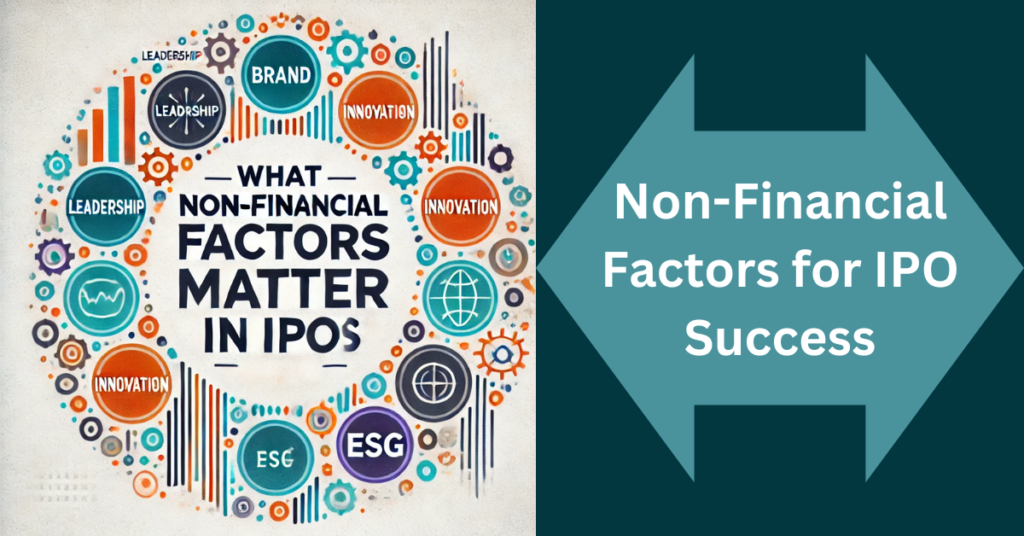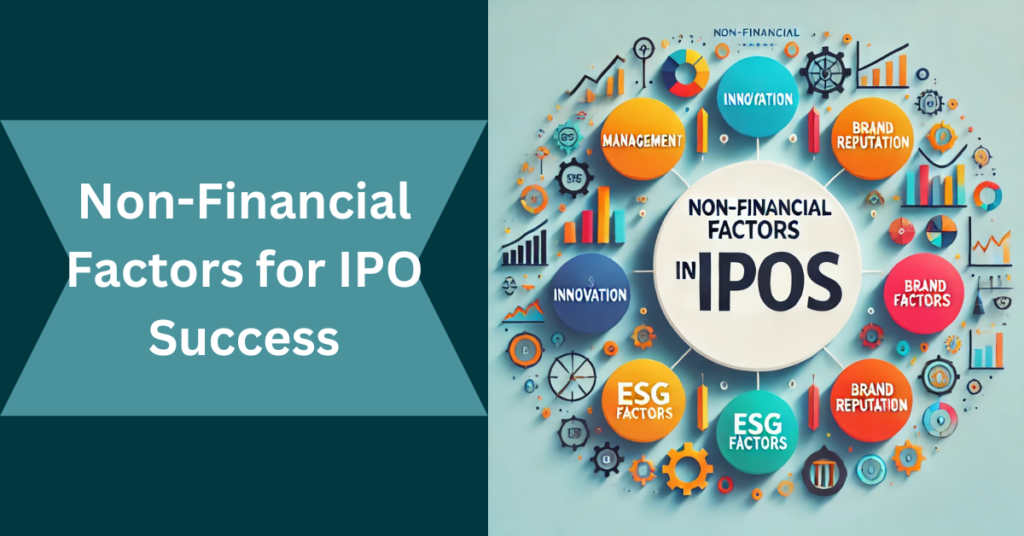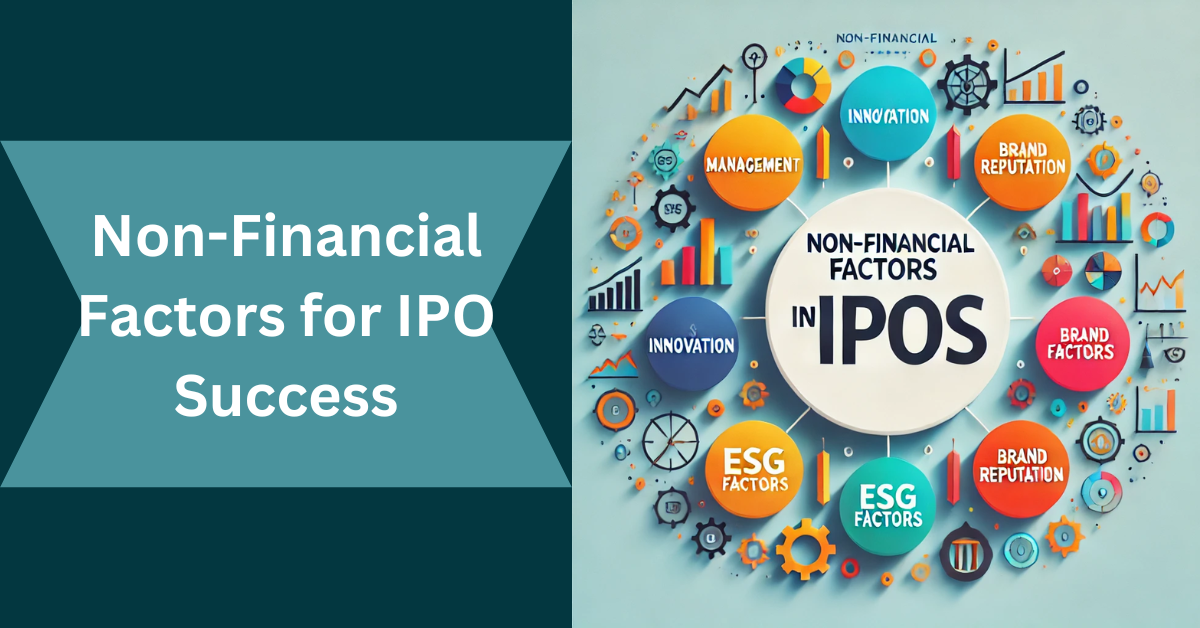What Are Some Non-Financial Factors for IPO Investors Consider When Investing in an IPO?
When a company goes public through an Initial Public Offering (IPO), it often attracts significant attention from investors. While financial metrics like revenue, profitability, and market valuation are critical, non-financial factors play an equally vital role in the decision-making process. These factors can influence an investor’s perception of the company’s potential for long-term success. Here, we explore some key non-financial aspects that investors consider before investing in an IPO.

- Some Non-Financial Factors for IPO Investors Consider When Investing in an IPO
- 1. Management Team and Leadership
- 2. Company Reputation and Brand Strength
- 3. Market Potential and Industry Trends-Non-Financial Factors for IPO
- 4. Corporate Governance and Transparency
- 5. Environmental, Social, and Governance (ESG) Factors
- 6. Innovation and Technology-Non-Financial Factors for IPO
- 7. Customer Base and Market Reach
- 8. Cultural Fit and Mission Alignment-Non-Financial Factors for IPO
- 9. Regulatory and Legal Environment
- 10. Employee Satisfaction and Workplace Culture
- Conclusion-Non-Financial Factors for IPO
- Disclaimer
Some Non-Financial Factors for IPO Investors Consider When Investing in an IPO
1. Management Team and Leadership
A company’s leadership can make or break its future. Investors often scrutinize the background, experience, and track record of the management team. Questions they might ask include:
- Does the CEO have experience in leading a publicly traded company?
- Is the leadership team diverse in terms of expertise and vision?
- Have they successfully navigated challenges in the past?
Strong leadership is a cornerstone of a company’s ability to adapt, innovate, and sustain growth. A well-rounded leadership team inspires confidence and signals that the company is in capable hands. Beyond qualifications, investors may also evaluate the team’s communication skills, decision-making process, and their ability to foster a positive organizational culture.
2. Company Reputation and Brand Strength
The company’s reputation in the market significantly impacts investor confidence. A strong brand with a positive image often suggests reliability and customer loyalty. Factors that contribute to this perception include:
- Customer satisfaction ratings.
- Media coverage and public sentiment.
- Historical dealings with stakeholders.
Investors are more likely to trust companies with a strong and respected presence in their industry. Moreover, a solid reputation often leads to increased customer retention and market resilience. Companies that handle crises transparently and efficiently also build trust, which can serve as a competitive advantage.
3. Market Potential and Industry Trends–Non-Financial Factors for IPO
Investors often assess the broader industry in which the company operates. They look for sectors with strong growth potential and companies positioned to capitalize on emerging trends. Key considerations include:
- Is the industry growing or declining?
- Does the company have a unique position or a competitive advantage?
- Are there barriers to entry that protect the company from competitors?
For example, companies in industries like renewable energy or artificial intelligence often garner more interest due to their future potential. Furthermore, understanding the company’s adaptability to changing market demands, disruptive technologies, and global economic shifts is crucial. Companies that demonstrate an ability to pivot and innovate often attract forward-thinking investors.
4. Corporate Governance and Transparency
Good corporate governance ensures that the company’s operations align with shareholder interests. Investors analyze:
- The composition of the board of directors (independence and expertise).
- Transparency in decision-making and disclosures.
- Ethical practices and policies.
A company with a reputation for ethical behavior and clear communication is more likely to win investor trust. Transparency extends to financial reporting, operational updates, and the handling of stakeholder concerns. Strong governance frameworks mitigate risks, ensuring that the company remains accountable to its investors and other stakeholders.
5. Environmental, Social, and Governance (ESG) Factors
In recent years, ESG considerations have become increasingly important for investors. Companies that prioritize sustainability, social responsibility, and good governance often attract long-term investors. Key ESG aspects include:
- Commitment to reducing carbon footprints.
- Diversity and inclusion in the workplace.
- Community engagement and social impact initiatives.
For instance, a company with strong sustainability practices may appeal more to environmentally conscious investors. Additionally, aligning with global ESG standards can open doors to institutional investments and partnerships. ESG-friendly companies often benefit from favorable media coverage, boosting their reputation and long-term value.
6. Innovation and Technology–Non-Financial Factors for IPO
The ability to innovate is a significant driver of success in today’s fast-paced world. Investors often evaluate:
- Research and development (R&D) investments.
- Adoption of advanced technologies.
- Status of Patents and intellectual property owned by the company.
Innovative companies are better equipped to adapt to changes and seize new opportunities, making them attractive investment options. Furthermore, a strong emphasis on R&D signals the company’s commitment to staying ahead in the market. Companies that foster a culture of innovation and encourage employee creativity are often viewed as more resilient in the face of challenges.

7. Customer Base and Market Reach
The size, diversity, and loyalty of a company’s customer base are crucial factors. Investors look for:
- A growing and diverse customer base.
- Strong relationships with key clients.
- Opportunities for international expansion.
Companies with a global reach and a loyal customer base often present more stable and scalable investment opportunities. Investors may also analyze customer acquisition strategies, retention rates, and overall market share. A company with a robust presence in emerging markets can further strengthen its appeal.
8. Cultural Fit and Mission Alignment–Non-Financial Factors for IPO
Some investors, especially individual or impact-focused ones, consider whether the company’s mission aligns with their personal values. This cultural fit can include:
- The company’s vision and goals.
- Ethical practices and treatment of employees.
- Contributions to society.
Investors often feel more confident supporting companies whose values resonate with their own. Furthermore, companies with a strong mission often enjoy higher employee morale and stronger brand loyalty. These elements can translate into long-term profitability and stability.
9. Regulatory and Legal Environment
Compliance with regulations and the broader legal landscape can influence investment decisions. Key considerations include:
- Pending lawsuits or legal disputes.
- Regulatory approvals and certifications.
- Potential risks associated with government policies.
A company with a clean legal record and robust compliance practices is less likely to face disruptions. Additionally, proactive measures to adapt to evolving regulations demonstrate foresight and reliability. Legal and regulatory stability can also impact international expansion plans, making it an essential area of focus for investors.
10. Employee Satisfaction and Workplace Culture
Happy employees are often a sign of a well-managed company. Investors might consider:
- Employee retention rates.
- Reviews on platforms like Glassdoor or LinkedIn.
- Company culture and employee engagement initiatives.
A motivated workforce can drive productivity and innovation, contributing to long-term success. Moreover, companies that invest in employee development and well-being often enjoy lower turnover rates and higher operational efficiency. Strong workplace culture can also enhance the company’s reputation as an employer of choice, attracting top talent.
Conclusion–Non-Financial Factors for IPO
Investing in an IPO is about more than just analyzing financial statements. Non-financial factors like leadership quality, brand reputation, market trends, and ESG practices offer critical insights into a company’s potential. By carefully evaluating these aspects, investors can make informed decisions and choose companies that align with their goals and values.
Whether you are a seasoned investor or new to the world of IPOs, keeping an eye on these non-financial factors can help you identify opportunities with strong long-term potential. Remember, a holistic approach often leads to better investment outcomes. Taking the time to understand the broader picture beyond financial metrics can significantly enhance your ability to spot winners in the IPO market. Non-Financial Factors for IPO
Disclaimer
This article relies on internal data, publicly available information, and other reliable sources. It may also include the authors’ personal views. However, it’s essential to note that the information is for general, educational, and awareness purposes only—it doesn’t disclose every material fact. This analysis is for informational purposes only and does not constitute financial advice. Consult a professional before making investment decisions.
We publish information on World Virtual CFO in good faith, solely for general information. World Virtual CFO doesn’t guarantee the completeness, reliability, or accuracy of this information. These are our views for informational purposes. When you use our website, know that any action you take is entirely at your own risk. World Virtual CFO won’t be liable for any losses or damages connected to your use of our website. For detailed information, refer to our disclaimer page.
Dr. Dinesh Sharma is an award-winning CFO and AI strategist with over two decades of experience in financial leadership, digital transformation, and business optimization. As the founder of multiple niche platforms—including WorldVirtualCFO.com—he empowers professionals and organizations with strategic insights, system structuring, and innovative tools for sustainable growth. His blogs and e-books blend precision with vision, making complex financial and technological concepts accessible and actionable.
